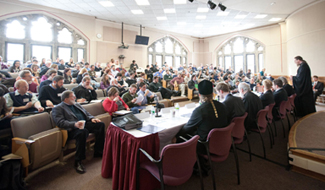Recent Princeton University Symposium Examined the Orthodox Doctrine of Atonement

Fr. John Behr delivers his lecture during symposium. |
The Father Georges Florovsky Orthodox Christian Theological Society of Princeton University held its first annual patristic symposium February 11-12, 2011 in Princeton, NJ.
Inspired by its namesake, the eminent 20th century Orthodox theologian and priest Father Georges Florovsky, the society chose to examine the patristic doctrine of atonement.
In theological parlance, “atonement” refers to the work of Christ in reconciling God and humanity. This is a topic of contention in Western systematic theology, and there are various competing theories that attempt to explain how Christ saves mankind from God’s just condemnation, specifically by suffering and dying on the cross.
These theories are generally absent from the Church Fathers. But, as Father Florovsky wrote, “The redeeming death is the ultimate purpose of the Incarnation.” What, then, is the distinctively Orthodox understanding of atonement, as expressed by the early Church Fathers?
Nearly 170 scholars, clergy, students, and lay people gathered to examine this question and to hear from eight respected Orthodox theologians.
Archpriest John Behr, Dean of Saint Vladimir’s Seminary, was among the lecturers at the symposium. Other lecturers included Protopresbyter George Dragas (Holy Cross Seminary), Father John McGuckin (Columbia University), Father Irenei Steenberg (Leeds Trinity University College), Dr. George Parsenios (Princeton Theological Seminary), Dr. Marcus Plested (University of Cambridge), Dr. Alexis Torrance (Notre Dame), and Matthew J. Baker (Fordham University).
An additional 65 participants from all over the world participated by watching a live online broadcast of the day’s lectures. Each lecture focused on a specific Church Father or set of sacred writings: the New Testament; Saints Irenaeus of Lyons, Athanasius of Alexandria, and Gregory the Theologian; the Greek ascetic Fathers; the Orthodox liturgical services; and, finally, the writings of Father Florovsky.
Several themes emerged during the day’s discussions.
First, the Fathers do not have one specific theory of atonement; rather, they see Christ’s salvific work as an organic whole—Incarnation, Crucifixion Resurrection, Ascension, and the sending of the Spirit to establish the Church. Our redemption is not determined by any one of these alone.
Second, even though the above is true, Christ’s death on the cross is still a central reality in Orthodox theology. As Saint Gregory the Theologian says, “We needed an Incarnate God; God put to death, that we might live” (Oration 45.28). Here we see the profound place of the cross within the larger “divine economy” of salvation. In his essay, “The Lamb of God,” Father Florovsky puts it this way: “Death is vanquished not simply by the appearance of Life in the mortal body, but rather by the voluntary death of the Incarnate Life. The Word became incarnate on account of death in the flesh, Saint Athanasius emphasizes. ‘In order to accept death He had a body,’ and only through His death was the resurrection possible.”
Third, we experience the redeeming power of the cross in our liturgical life and spiritual struggle. In Baptism, we die and rise with Christ. We receive the Eucharist for forgiveness of sins. And, ultimately, through the ascetic struggle to die to our own desires, we enter into true union with God. This sacramental and ascetic reality is essential.
A complete list of speakers, photos, and more information is available at http://www.princeton.edu/~florov and http://www.facebook.com/florovsky. The Society will hold its second annual patristic symposium next year, February 10 and 11, 2012. The theme will be “The Body of the Living Christ: The Patristic Doctrine of the Church.”
The Father Georges Florovsky Orthodox Christian Theological Society is a graduate student organization of Princeton University. Its purpose is to promote the study of the life and work of Florovsky and of Orthodox Christian theology in general in the context of Florovsky’s emphasis on a return to Orthodox Christianity’s patristic roots.
Seraphim Danckaert is Assistant Director of Programs at Princeton Theological Seminary.
